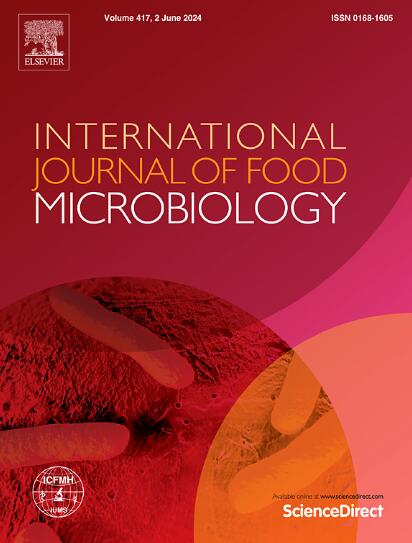Variation in heat resistance of Clostridium sporogenes spores in oils and oil-water systems: Insights from oil physicochemical properties and spore surface properties
IF 5
1区 农林科学
Q1 FOOD SCIENCE & TECHNOLOGY
International journal of food microbiology
Pub Date : 2025-04-09
DOI:10.1016/j.ijfoodmicro.2025.111194
引用次数: 0
Abstract
Our recent research found that oil could greatly improve the heat resistance of Clostridium sporogenes spores in liquid foods. To figure out the key factors influencing the spore heat resistance, we characterized the heat resistance of C. sporogenes CICC 8021 spores in three pure edible oils (rapeseed oil, peanut oil, and palm oil) and their oil-water systems and analyzed their relations with the oil's physicochemical properties and spore surface properties. The results showed that in pure oils, the water activity (aw) of oil is significantly negatively related to spore heat resistance (P < 0.05). In the oil-water systems, the distribution of the spores was affected by the addition level of peanut and palm oils, but not applied to rapeseed oil. In the low-oil system (10 % peanut oil-water system), the spore hydrophobicity increased during heating, causing the spores to migrate to the oil phase and thus increasing spore heat resistance. In the high-oil system (50 % peanut oil-water system), the increase of the spore's ζ-potential during heating was the key factor for the spore heat resistance. The interfacial tension of peanut oil decreased at the elevated temperature, facilitating the adsorption of the spores at the oil-water interface and their entrance to the oil phase, and this is worth further exploration. This study provides a novel interpretation of oil physicochemical properties and spore surface characteristics on the heat resistance of C. sporogenes spores in oils and oil-water systems, offering valuable insights for exploring the mechanism of spore resistance in liquid foods with oils.
芽孢梭菌孢子在油和油水体系中的耐热性变化:来自油的物理化学性质和孢子表面性质的见解
我们最近的研究发现,油可以大大提高液态食品中孢子梭菌孢子的耐热性。为了找出影响孢子耐热性的关键因素,我们对孢子梭菌 CICC 8021 孢子在三种纯食用油(菜籽油、花生油和棕榈油)及其油水体系中的耐热性进行了表征,并分析了它们与油的理化性质和孢子表面性质的关系。结果表明,在纯油中,油的水活性(aw)与孢子耐热性显著负相关(P < 0.05)。在油水体系中,孢子的分布受花生油和棕榈油添加量的影响,但菜籽油不受影响。在低油体系(10% 花生油-水体系)中,孢子的疏水性在加热过程中增加,导致孢子迁移到油相中,从而增加了孢子的耐热性。在高油体系(50% 花生油-水体系)中,加热过程中孢子ζ电位的增加是孢子耐热性的关键因素。花生油的界面张力在温度升高时降低,有利于孢子吸附在油水界面并进入油相,这一点值得进一步探讨。本研究对油的理化性质和孢子表面特征对孢子芽孢杆菌孢子在油和油水体系中耐热性的影响做出了新的解释,为探索含油液态食品中孢子耐热性的机理提供了有价值的见解。
本文章由计算机程序翻译,如有差异,请以英文原文为准。
求助全文
约1分钟内获得全文
求助全文
来源期刊
CiteScore
10.40
自引率
5.60%
发文量
322
审稿时长
65 days
期刊介绍:
The International Journal of Food Microbiology publishes papers dealing with all aspects of food microbiology. Articles must present information that is novel, has high impact and interest, and is of high scientific quality. They should provide scientific or technological advancement in the specific field of interest of the journal and enhance its strong international reputation. Preliminary or confirmatory results as well as contributions not strictly related to food microbiology will not be considered for publication.

 求助内容:
求助内容: 应助结果提醒方式:
应助结果提醒方式:


